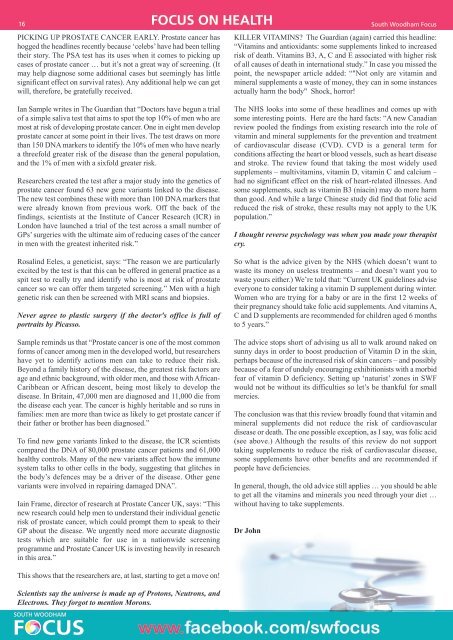856 pages
You also want an ePaper? Increase the reach of your titles
YUMPU automatically turns print PDFs into web optimized ePapers that Google loves.
FOCUS ON HEALTH<br />
South 16 Woodham<br />
South Woodham Focus<br />
PICKING UP PROSTATE CANCER EARLY. Prostate cancer has<br />
hogged the headlines recently because ‘celebs’ have had been telling<br />
their story. The PSA test has its uses when it comes to picking up<br />
cases of prostate cancer … but it’s not a great way of screening. (It<br />
may help diagnose some additional cases but seemingly has little<br />
significant effect on survival rates). Any additional help we can get<br />
will, therefore, be gratefully received.<br />
KILLER VITAMINS? The Guardian (again) carried this headline:<br />
“Vitamins and antioxidants: some supplements linked to increased<br />
risk of death. Vitamins B3, A, C and E associated with higher risk<br />
of all causes of death in international study.” In case you missed the<br />
point, the newspaper article added: “"Not only are vitamin and<br />
mineral supplements a waste of money, they can in some instances<br />
actually harm the body" Shock, horror!<br />
Ian Sample writes in The Guardian that “Doctors have begun a trial<br />
of a simple saliva test that aims to spot the top 10% of men who are<br />
most at risk of developing prostate cancer. One in eight men develop<br />
prostate cancer at some point in their lives. The test draws on more<br />
than 150 DNA markers to identify the 10% of men who have nearly<br />
a threefold greater risk of the disease than the general population,<br />
and the 1% of men with a sixfold greater risk.<br />
Researchers created the test after a major study into the genetics of<br />
prostate cancer found 63 new gene variants linked to the disease.<br />
The new test combines these with more than 100 DNA markers that<br />
were already known from previous work. Off the back of the<br />
findings, scientists at the Institute of Cancer Research (ICR) in<br />
London have launched a trial of the test across a small number of<br />
GPs’ surgeries with the ultimate aim of reducing cases of the cancer<br />
in men with the greatest inherited risk.”<br />
Rosalind Eeles, a geneticist, says: “The reason we are particularly<br />
excited by the test is that this can be offered in general practice as a<br />
spit test to really try and identify who is most at risk of prostate<br />
cancer so we can offer them targeted screening.” Men with a high<br />
genetic risk can then be screened with MRI scans and biopsies.<br />
Never agree to plastic surgery if the doctor's office is full of<br />
portraits by Picasso.<br />
Sample reminds us that “Prostate cancer is one of the most common<br />
forms of cancer among men in the developed world, but researchers<br />
have yet to identify actions men can take to reduce their risk.<br />
Beyond a family history of the disease, the greatest risk factors are<br />
age and ethnic background, with older men, and those with African-<br />
Caribbean or African descent, being most likely to develop the<br />
disease. In Britain, 47,000 men are diagnosed and 11,000 die from<br />
the disease each year. The cancer is highly heritable and so runs in<br />
families: men are more than twice as likely to get prostate cancer if<br />
their father or brother has been diagnosed.”<br />
To find new gene variants linked to the disease, the ICR scientists<br />
compared the DNA of 80,000 prostate cancer patients and 61,000<br />
healthy controls. Many of the new variants affect how the immune<br />
system talks to other cells in the body, suggesting that glitches in<br />
the body’s defences may be a driver of the disease. Other gene<br />
variants were involved in repairing damaged DNA”.<br />
Iain Frame, director of research at Prostate Cancer UK, says: “This<br />
new research could help men to understand their individual genetic<br />
risk of prostate cancer, which could prompt them to speak to their<br />
GP about the disease. We urgently need more accurate diagnostic<br />
tests which are suitable for use in a nationwide screening<br />
programme and Prostate Cancer UK is investing heavily in research<br />
in this area.”<br />
The NHS looks into some of these headlines and comes up with<br />
some interesting points. Here are the hard facts: “A new Canadian<br />
review pooled the findings from existing research into the role of<br />
vitamin and mineral supplements for the prevention and treatment<br />
of cardiovascular disease (CVD). CVD is a general term for<br />
conditions affecting the heart or blood vessels, such as heart disease<br />
and stroke. The review found that taking the most widely used<br />
supplements – multivitamins, vitamin D, vitamin C and calcium –<br />
had no significant effect on the risk of heart-related illnesses. And<br />
some supplements, such as vitamin B3 (niacin) may do more harm<br />
than good. And while a large Chinese study did find that folic acid<br />
reduced the risk of stroke, these results may not apply to the UK<br />
population.”<br />
I thought reverse psychology was when you made your therapist<br />
cry.<br />
So what is the advice given by the NHS (which doesn’t want to<br />
waste its money on useless treatments – and doesn’t want you to<br />
waste yours either.) We’re told that: “Current UK guidelines advise<br />
everyone to consider taking a vitamin D supplement during winter.<br />
Women who are trying for a baby or are in the first 12 weeks of<br />
their pregnancy should take folic acid supplements. And vitamins A,<br />
C and D supplements are recommended for children aged 6 months<br />
to 5 years.”<br />
The advice stops short of advising us all to walk around naked on<br />
sunny days in order to boost production of Vitamin D in the skin,<br />
perhaps because of the increased risk of skin cancers – and possibly<br />
because of a fear of unduly encouraging exhibitionists with a morbid<br />
fear of vitamin D deficiency. Setting up ‘naturist’ zones in SWF<br />
would not be without its difficulties so let’s be thankful for small<br />
mercies.<br />
The conclusion was that this review broadly found that vitamin and<br />
mineral supplements did not reduce the risk of cardiovascular<br />
disease or death. The one possible exception, as I say, was folic acid<br />
(see above.) Although the results of this review do not support<br />
taking supplements to reduce the risk of cardiovascular disease,<br />
some supplements have other benefits and are recommended if<br />
people have deficiencies.<br />
In general, though, the old advice still applies … you should be able<br />
to get all the vitamins and minerals you need through your diet …<br />
without having to take supplements.<br />
Dr John<br />
This shows that the researchers are, at last, starting to get a move on!<br />
Scientists say the universe is made up of Protons, Neutrons, and<br />
Electrons. They forgot to mention Morons.<br />
SOUTH WOODHAM<br />
FOCUS<br />
www.facebook.com/swfocus


















